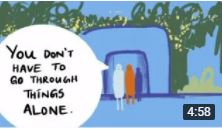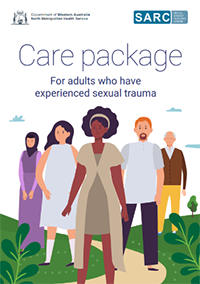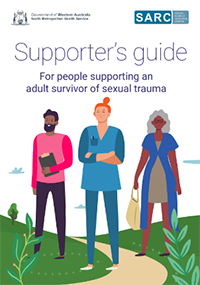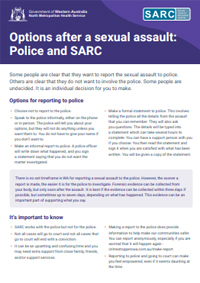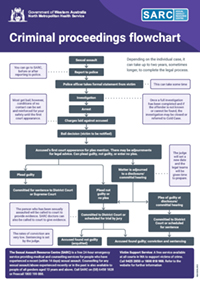Crisis services at SARC
If you’ve been sexually assaulted or raped, there are some important things to do for yourself:
- Ensure you are safe
- Contact SARC (for people living in Perth and Peel)
- Get medical help (for people living in regional areas)
- Get support
- Report to the police (if you choose to)
Ensure you are safe
If you are in danger now, call 000 and ask for the police.
If you have serious injuries or bleeding, get medical help as soon as possible. Locate your nearest hospital Emergency Department (external site) in Western Australia.
For support and advice about domestic violence:
- Call 1800RESPECT on 1800 737 732
- Call the Women’s Domestic Violence Helpline on 1800 007 339
- Call the Men’s Domestic Violence Helpline on 1800 000 599
If you’re at risk of harming yourself:
- Call Lifeline on 13 11 14
- Call the Suicide Call Back Service 1300 659 467
For emergency mental health support, call the Mental Health Emergency Response Line (MHERL):
- Perth residents: 1300 555 788
- Peel residents: 1800 676822
- Regional residents call Rurallink: 1800 552 002
For police help, if you’re not in immediate danger:
- Call a local police station on 131 444
Contact SARC (for people living in Perth and Peel)
If you’ve been sexually assaulted or raped in the last two weeks, SARC can provide three types of service:
- Crisis medical services related to sexual assault.
- Forensic evidence collection related to sexual assault.
- Crisis counselling services related to sexual assault.
The services are available for people of all genders aged 13 years and above. Crisis services for people under 13 years are provided by the Child Protection Unit (external site) at Perth Children’s Hospital. They can be contacted by calling (08) 6456 0089.
Crisis medical services
If you have serious injuries or bleeding, get medical help at a hospital Emergency Department or call an ambulance on 000 urgently.
If you don’t have serious injuries or bleeding, it’s important to see a doctor (or nurse) as soon as possible. A doctor (including a doctor at SARC) can help with physical injuries, screening for sexually transmitted infections (STIs) and emergency contraception (morning after pill) to stop unwanted pregnancy. If pressure to the neck (strangulation) was involved in the assault, there may be serious health risks and the doctor can arrange tests to be done if required.
Find out more about the risks of strangulation (PDF).
SARC crisis medical help – for people living in Perth and Peel
Contact the SARC 24-hour Crisis Line anytime of the day or night, seven days a week
Call (08) 6458 1828 or 1800 199 888 (freecall from landlines)
If you’re injured, you will be asked to go to a hospital Emergency Department.
If you are not injured, you may be asked to meet the SARC doctor and counsellor at the SARC rooms in Subiaco.
SARC doctors provide free testing, advice and treatment about the risk of pregnancy, emergency contraception, sexually transmitted infections (STIs) and blood-borne infections such as HIV, Hepatitis B and Hepatitis C.
Find out more about what happens when you call or come to SARC.
Forensic evidence collection
SARC will respect decisions you make about reporting to police. SARC is not connected to the police. You can still see someone at SARC if:
- You have decided you don’t want to report to the police.
- You want to involve the police.
- You are unsure if you want to involve the police or not.
With your permission, SARC doctors can do a forensic examination. In some cases forensic evidence may only be available for up to 24 hours after the assault, so it’s important to contact SARC as soon as possible.
If you are unsure whether you want to report the sexual assault to the police or not, forensic evidence can be gathered by SARC doctors and stored for up to six months. If you choose to report to the police, the evidence may be used in a court case.
Read more about reporting to the police at the bottom of the page.
SARC will respect decisions you make about reporting to the police.
Find out more about what happens when you come to SARC.
Crisis counselling services
A sexual assault can be an extremely traumatic experience. You can telephone SARC at any time of the day or night following a sexual assault.
Call (08) 6458 1828 or 1800 199 888 (freecall from landlines)
SARC understand sexual trauma can have many challenging impacts for the survivor and the people in their lives.
Find out more about what happens when you call SARC.
Get medical help for people living in regional areas
It’s important to see a doctor (or nurse) as soon as possible. The doctor can help with physical injuries, screening for sexually transmitted infections (STIs) and emergency contraception (morning after pill) to stop unwanted pregnancy. If pressure to the neck (strangulation) was involved in the assault, there may be serious health risks and the doctor may order tests to be done.
If you’re injured, go to a hospital Emergency Department or nursing post as soon as possible.
If you are not injured, contact your local Sexual Assault Support Services. You will find these listed in directories for your local area. Some options are listed on the handout Services in WA (PDF).
Find out more about confidentiality at SARC medical/forensic appointments (PDF).
Get support
Sexual assault is a traumatic experience and can impact you in many ways. If you are struggling to cope after the assault, it’s important get help.
SARC offers crisis telephone counselling between 8:30am – 11pm each day.
Call the SARC Crisis Line on (08) 6458 1828 or 1800 199 888 (freecall from landlines).
There are other services available to support you. Some options are listed in the handout Services in WA (PDF).
You may also find it helpful to speak with a trusted person you know, who will be supportive and understanding.
SARC offers a Care Package for anyone who has experienced sexual trauma. The package explains the many impacts of sexual trauma and provides ideas to assist your recovery.
A Supporter’s Guide is available for anyone who is supporting you. It will help them understand the impacts the experience can have on you and suggest ways for them to support you. More information is also available about support for family, friends and support people.
You don’t need to go through this alone.
Report to the police (if you choose to)
Sexual assault is a crime and there’s no set timeframe in Western Australia for reporting. However, it’s best to report the assault as soon as possible (within three days is best). For forensic evidence to be gathered, it’s best not to shower or wash clothing.
To report a sexual assault to police:
Call a local police station on 131 444
If you are unsure about going to the police, you can call SARC if you live in Perth or Peel, or a local sexual assault support service if you live in a regional area, to discuss options for reporting the sexual assault.


